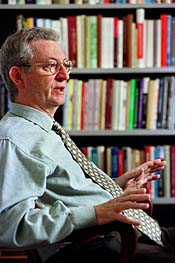

|
FROM THE CHANCELLOR Advancing possibilities 
You are familiar, no doubt, with the saying, "Opportunity knocks only once." While that may be true in some cases, there are times when we must seek out opportunity and invite it into our lives. In fact, each time we react to the changing world around us, we can create new possibilities. Advancing these possibilities is one of my most important roles at the University of Wisconsin-Madison. During my eight years as chancellor, I have sought to do so in an environment of rapid and often dizzying change. At perhaps no time since the Great Depression has there been more dramatic upheaval – and potential – in higher education. The pace of discovery has never been faster, uncovering entirely new worlds of knowledge that we must be equipped to explore. New technologies are reshaping the ways in which we teach and share information. And, at the same time that these forces compel universities to adapt, government support for higher education has dwindled, and universities have had to find alternative funding for their operations. When I first faced these challenges as chancellor, I had two choices: I could consider these forces a mere swing of the pendulum and trust in an eventual return to normalcy, or I could acknowledge that it was time to confront an entirely new climate for universities. I chose the second scenario. And as we move into this new century, the more I am convinced that it was the right choice for this university. At UW-Madison, the reaction to unrelenting change has been neither avoidance nor apprehension. Instead, in the tradition of those who founded this great university, we have taken on the task at hand, finding new solutions and embracing new ideas.
As I prepare to step down as chancellor, I salute our progress. We have added a new chapter to UW-Madison's long history of brilliant innovation by developing creative programs that address the changing needs of our students and constituents. Our groundbreaking strategic hiring program, for example, presents an excellent model of our ability to adapt to the changing nature of intellectual life. This program is bringing together interdisciplinary groups of faculty to work on unfolding, complex problems, recognizing that some of the arbitrary boundaries between academic disciplines are no longer viable. These faculty teams are sharing knowledge and working at the interfaces of their departments, in areas ranging from genomics to international relations to women's health. We have appointed more than 50 new faculty to form working groups across campus and additional searches are underway. These teams are already producing tangible results. Some, in fact, have developed new programs and technologies, representing only the beginning of a fruitful collaboration. In 1998, I proposed a way to ensure that the university can not only set high expectations, but also meet them. I proposed the Madison Initiative, a new four-year partnership to fill a gap in the university's budget that developed during the years of lagging state support. We approached the state with a plan that would combine a special allocation of money from the state with funds from private gifts and grants. This unique approach was initiated during the 1999-2000 fiscal year, and I am excited by the initial results. In this report, you will learn how the second phase of the Madison Initiative is based on several pilot projects that will help UW-Madison to reach four very important goals: continuing innovative programs such as strategic hiring, broadening the opportunities for our students, maintaining our tradition of affordable tuition, and fostering Wisconsin's future economic growth and prosperity. The Madison Initiative gives the university the base funding it requires to maintain excellence, while ensuring that UW-Madison remains at its heart a public institution. With adequate state support, we are able to leverage the philanthropic donations of those who are committed to our public mission (the UW Foundation) and the return on the intellectual properties of our faculty and staff (the Wisconsin Alumni Research Foundation). Together, these funding sources form a strong investment in the intellectual resources on campus – an investment that can reap enormous rewards. This spring, the state will consider its 2001-03 budget, including a proposal for the final two years of the Madison Initiative. I hope you will agree that the first phase of the Madison Initiative has taken us down a promising path and that the plan deserves continued support. Thanks to invaluable teamwork, I truly believe that we are positioned for greatness in this new century. I am grateful to the UW Foundation, the Wisconsin Alumni Association, WARF and our campus partners for their unwavering support. I have spent my entire academic life at UW-Madison. My thirty-eight years as a graduate student, professor and administrator on this campus have taught me about its special character. I have learned never to doubt the ability of the UW-Madison community to be energized by change and to rise to a challenge. Let us continue to invite opportunity, and enjoy the results.
David Ward, Chancellor
|
|||||||||||||||||||||
|
Table of contents | Chancellor's special reports | UW Home | Feedback |
|
|